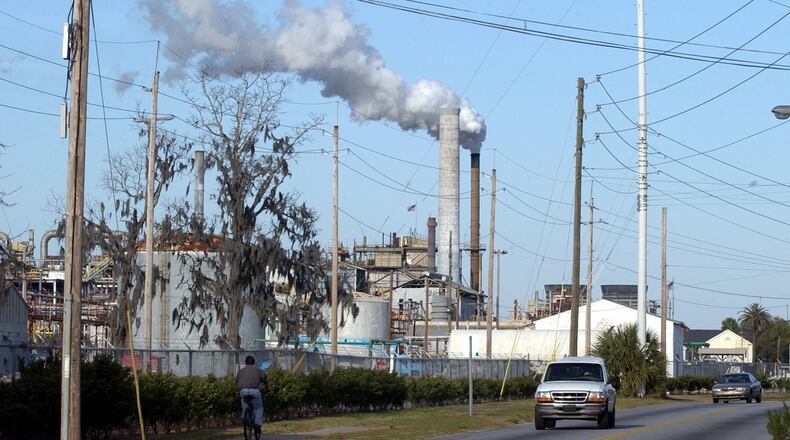Nearly two-thirds of Georgia voters believe the U.S. should do more to combat climate change, according to a new Atlanta Journal-Constitution poll, suggesting local voters would like to see a change of course on an issue that’s deeply divided state and federal lawmakers.
The survey found that about 63% of Georgia voters think the country is not doing enough to address climate change, compared with about 31% who replied the U.S. has responded adequately or even done too much.
Women were more likely than men to believe more should be done — 66% compared with 58% — and richer people making between $100,000 and $150,000 a year were almost three times more likely than the state’s poorest voters to believe the country has acted appropriately.
The survey, which had a margin of error of 3 percentage points, was conducted Oct. 30 to Nov. 8 by the University of Georgia’s School of Public and International Affairs. It marked the first time the AJC has asked about climate change in a statewide survey.
» Interactive: See poll results
» Related: How — and why — we conducted this poll
» Related: Trump faces tough re-election fight in Georgia
» Related: Georgians support impeachment inquiry, split on Trump ouster
» PDF: Complete poll crosstabs
The poll was conducted the same week the Trump administration formally notified the United Nations that the U.S. would withdraw from the Paris climate accord, the landmark 2015 pact in which nearly 200 nations agreed to reduce their greenhouse gas emissions.
President Donald Trump called the accord “terrible” and “one-sided” at a recent appearance in Pittsburgh.
“What we won’t do is punish the American people while enriching foreign polluters,” he said.
Overall, Georgia voters’ party affiliations were a relatively reliable indicator of their opinions on climate policies.
While more than 91% of Democrats surveyed said more needed to be done on climate, only about 30% of their GOP peers agreed. Nearly 70% of independents, a key voting bloc in Georgia, said the U.S.’ response was inadequate.
One of those Georgians is Zach Hartman, a scientific content manager in Sandy Springs.
The 33-year-old said he tries not to affiliate with a political party but identified climate change as an “existential threat.”
“Even if it ends up not being an existential threat, we don’t really get a do-over on it,” Hartman said. “I don’t see the losses as great enough to justify the inaction that we’re seeing and denial and outright anti-intellectualism that surrounds it.”
Some of the starkest divides among the poll’s respondents were racial and generational. More than 84% of black voters surveyed said the country’s current response was inadequate, compared with just 51% of white voters. Millennials under the age of 30 were the least likely of any age group to believe the country was doing enough to combat global warming, with roughly three-quarters of voting-age young people wanting to see more done.
About 1 in 4 of the voters surveyed between the ages of 45 and 64 said the country was doing enough to fight climate change. That included William Blake, 54, a master electrician in Leesburg.
“Mother Nature is going to take care of itself, but we can control some of the emissions,” he said, voicing support for technology that removes emissions from coal plant exhaust.
But Blake also warned about carbon-cutting “overkill,” and he voiced support for Trump’s move to remove the U.S. from the Paris agreement.
“Look at all the other countries — they’re just polluting everything,” he said after acknowledging that the U.S. is a leading carbon emitter. “If anything, we need to push for other countries to get up to our standards.”
Over the past three years, Trump has moved to undo many of the major actions undertaken by his predecessor to reduce global warming-causing greenhouse gas emissions.
He opted to replace President Barack Obama's strict power plant regulations last year with a looser alternative that gave states such as Georgia broad leeway to set their own targets for cutting emissions from coal stations. And in September, Trump blocked state-level efforts in California to regulate emissions from auto tailpipes, another major contributor to climate change.
Democrats have not lined up behind a single counterproposal.
Beyond a symbolic vote in the U.S. House urging Trump to keep the country in the Paris agreement, Speaker Nancy Pelosi has not brought any climate legislation to the floor. Shortly after Democrats retook the majority in the chamber, she created a Select Committee on the Climate Crisis that plans to issue recommendations next year.
Freshman U.S. Rep. Alexandria Ocasio-Cortez’s sweeping “Green New Deal,” which calls for the country to mobilize to end its dependency on fossil fuels over the next decade, has inspired several White House hopefuls but has not received a hearing on Capitol Hill. It’s also provided an opening for the GOP to attack vulnerable Democrats on the campaign trail.
Locally, Georgia has taken some initial steps to combat climate change such as developing long-term plans to help coastal counties adapt to rising sea levels. But officials have resisted the more ambitious efforts undertaken by other states.
Gov. Brian Kemp took a cautious view of the issue during the campaign. He said then that he supports "fact-based efforts" to protect the environment without involving more "government red tape," and earlier this year he said "we've got to be prepared" for extreme weather.
At the same time, Kemp has said “government cannot do everything for everybody.”
“People are going to have to be responsible,” he said, “especially when they’re property owners.”
AJC poll
The poll of 1,028 registered voters was conducted Oct. 30 to Nov. 8 by the University of Georgia’s School of Public and International Affairs. The margin of error is 3 percentage points.
Do you think the United States is doing enough to address climate change, doing too much, or do you think more needs to be done to address climate change?
1. Doing enough — 23%
2. Doing too much — 8%
3. More needs to be done — 63%
4. Don’t know; refused to answer — 6%
Note: The survey was conducted by telephone, with 70% of calls made to cellphones and 30% to traditional landlines. The data are weighted based on race, age and sex to accurately reflect the demographics of the state. Some totals may not equal 100% due to rounding.
About the Author
Keep Reading
The Latest
Featured




